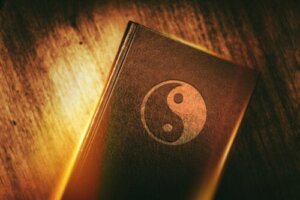Origin, Characteristics and Principles of Taoism


Written and verified by the philosopher Maria Alejandra Morgado Cusati
Taoism is a Chinese philosophical current that emerged between the sixth and fourth centuries B.C. from the writings of Lao-Tze. The teachings of this tradition are based on living in harmony with the universe and letting things follow their natural course, without any attachment.
We don’t know much about Lao-Tze but his teachings form the basis of Eastern thought. His virtues include compassion, moderation, humility, and naturalness as ways to lead a fulfilled life.
Taoism
This is one of the most widely practiced philosophical and religious traditions in China. Its literal translation is the teaching of “the way” (the tao) and refers to living in harmony with it.
In this respect, the tao is the source of all that exists, the timeless and unlimited energy that governs the universe. It is, therefore, indefinable and the senses can’t perceive it. It’s also what generates all phenomena in the world.
Wu Wei (inaction) is one of the principles of Taoism and implies letting things flow. This way the tao acts by itself as things follow their natural and spontaneous course.
The main text of this philosophy is the Tao Te Ching, which means “way of virtue.” The authorship is attributed to Lao Tze and we don’t know the date he wrote it.

Read about Five Mindfulness Exercises for Anxiety
General characteristics of Taoism
The most outstanding characteristics of this philosophical and religious movement are:
- It emphasizes values such as compassion, kindness, piety, fairness, introspection, harmony with nature, selflessness, and magnanimity.
- It advocates human harmony with the tao and believes in the ethereal course of things.
- Also, it exalts stillness as a way of attaining harmony.
- The symbol of tao is called Tajitu, consisting of yin and yang within a circle. It represents duality (hot-cold, dry-wet, male-female) as well as the continuous change that governs the tao. According to this theory, there are three interacting forces: yin, yang, and tao. The first two are complementary and antagonistic, but they need each other. Furthermore, tao is a superior force that contains the other two.
- The tao believes in and seeks immortality. Some say you mustn’t understand immortality literally but rather as achieving longevity and enjoying it to the fullest.
What are the principles of Taoism?
The following teachings of Taoism are its most fundamental principles.
- Happiness isn’t equal to the possession of material goods
- For Taoism, happiness isn’t related to the number of material possessions. In this respect, Lao-Tze said that whoever wasn’t happy with little, wouldn’t be happy with much else either.
Desire begets suffering
The master of Taoism says that those who don’t desire aren’t frustrated. And they who aren’t frustrated cannot be debased.
Thus, it’s important to get rid of unnecessary things and stop wanting more. This way you’ll wait in stillness and observe how everything happens. You won’t let desires interfere in the peace and harmony offered by the natural course of things.
Assuming love as a tool for growth
Taoism seeks to foster nonviolence. Thus, it assumes love as a force that can improve a person. In fact, those who are deeply loved are strong and those who love deeply are courageous, according to Lao-Tze.
Wu Wei
The expression Wu Wei means learning to flow with the nature of things and with minimal effort. Thus, Taoism invites you to see things as they are, considering their good, bad and regular aspects.
The important thing, according to Lao-Tze, is to observe all the positive things around you while keeping in mind all the negative things that exist.
Know yourself
This is perhaps one of life’s great challenges. Surely you won’t be able to attain it entirely. However, the ideal is to work daily to understand who you are.
This is because it’s the best way to understand how you respond to difficult circumstances and how you can change some aspects of yourself. With respect to this teaching, Lao-Tze affirmed that those who master others may be strong, but those who master themselves are powerful.

Ways to apply Taoism in daily life
Wu Wei is a principle one can apply to daily life to find peace and fulfillment. The following is important in order to achieve this:
- Leave aside ambitions and desires and be more attached to the simplicity of your existence.
- Don’t worry as this keeps you anchored in the past and anxious about the future. Believe it or not, worries flood the mind because you allow them to. One way to learn to let go of them is through meditation.
- Learn to appreciate and accept natural changes and let them happen without allowing them to interfere with your goals and aspirations.
- Accept that you actively create your own problems.
- Don’ worry about how your mind represents your problems. To do so, you must let them dissolve in the course of thought.
Learn about Wu Wei, The Art of Solving Problems Effortlessly
Experience Taoism
Finally, the philosophy of Taoism can be complex. However, it’s a way of life one can cultivate through practice, with small actions that promote simplicity, harmony with nature, and non-violence.
All cited sources were thoroughly reviewed by our team to ensure their quality, reliability, currency, and validity. The bibliography of this article was considered reliable and of academic or scientific accuracy.
- Gazi, N. El ying y el yang en el taoísmo. Rev Sufi [Internet]. 2005; 10: 44-47: Disponible en: https://nematollahi.com/revistasufi/articulos/Simbolismo_ying_yang.pdf
- Lao Tse. Tao te King [Internet]. Obras clásicas de siempre; 571-537 a.C. [Consultado 26 jun 2021]. Disponible en: http://bibliotecadigital.ilce.edu.mx/Colecciones/ObrasClasicas/_docs/TaoTeKing_LaoTse.pdf
- Yutang L. La filosofía del taoismo. Run [Internet]. 1949;14(14): 33-9. Disponible en: https://revistas.unal.edu.co/index.php/revistaun/article/view/13753
This text is provided for informational purposes only and does not replace consultation with a professional. If in doubt, consult your specialist.








